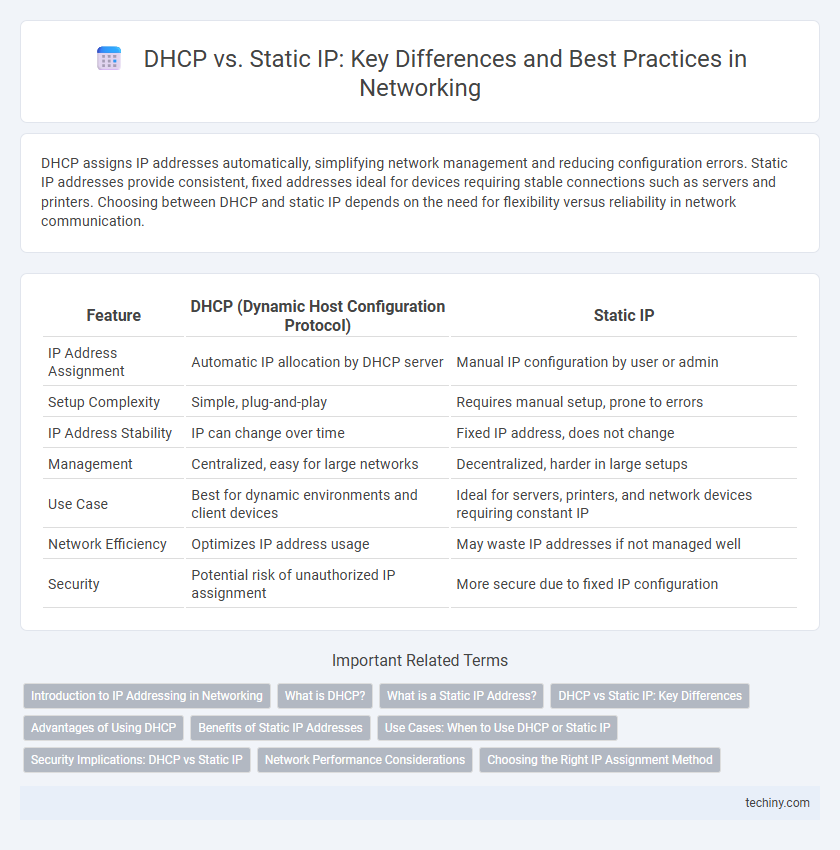DHCP assigns IP addresses automatically, simplifying network management and reducing configuration errors. Static IP addresses provide consistent, fixed addresses ideal for devices requiring stable connections such as servers and printers. Choosing between DHCP and static IP depends on the need for flexibility versus reliability in network communication.
Table of Comparison
| Feature | DHCP (Dynamic Host Configuration Protocol) | Static IP |
|---|---|---|
| IP Address Assignment | Automatic IP allocation by DHCP server | Manual IP configuration by user or admin |
| Setup Complexity | Simple, plug-and-play | Requires manual setup, prone to errors |
| IP Address Stability | IP can change over time | Fixed IP address, does not change |
| Management | Centralized, easy for large networks | Decentralized, harder in large setups |
| Use Case | Best for dynamic environments and client devices | Ideal for servers, printers, and network devices requiring constant IP |
| Network Efficiency | Optimizes IP address usage | May waste IP addresses if not managed well |
| Security | Potential risk of unauthorized IP assignment | More secure due to fixed IP configuration |
Introduction to IP Addressing in Networking
IP addressing in networking assigns unique numerical labels to devices, enabling communication within and across networks. Dynamic Host Configuration Protocol (DHCP) automates IP address allocation, reducing configuration errors and simplifying management. Static IP addresses provide fixed, consistent network identification, crucial for servers and devices requiring stable connections.
What is DHCP?
DHCP (Dynamic Host Configuration Protocol) is a network management protocol that automatically assigns IP addresses and other network configuration parameters to devices on a local network. It streamlines the process of IP address allocation by dynamically distributing available addresses from a predefined pool, reducing manual configuration errors. DHCP enhances network scalability and flexibility by enabling devices to join and leave the network without requiring constant IP reassignment.
What is a Static IP Address?
A static IP address is a fixed, unchanging numerical label assigned manually to a device on a network, ensuring consistent identification and accessibility. Unlike DHCP-assigned dynamic IPs, static IP addresses provide reliable connections crucial for hosting servers, remote access, and network devices requiring constant IP configuration. Static IPs facilitate stable communication protocols and enhance network management by preventing IP conflicts and streamlining device tracking.
DHCP vs Static IP: Key Differences
DHCP (Dynamic Host Configuration Protocol) automates IP address assignment, enabling devices to join networks quickly without manual configuration, whereas static IP requires manual input and remains constant. DHCP enhances network scalability and reduces configuration errors by dynamically allocating IP addresses from a predefined pool. Static IP provides greater control and stability for devices needing consistent addressing, ideal for servers and networked devices requiring persistent access.
Advantages of Using DHCP
DHCP simplifies network management by automatically assigning IP addresses, reducing configuration errors and administrative workload. It enables dynamic IP address allocation, which allows devices to connect seamlessly without manual setup. Centralized control in DHCP also improves scalability and efficient address utilization across large networks.
Benefits of Static IP Addresses
Static IP addresses provide consistent network identification crucial for hosting servers, remote access, and reliable device communication. They enhance network security by enabling precise IP filtering and easier management of firewall rules. This stability reduces conflicts and downtime, optimizing network performance for critical applications.
Use Cases: When to Use DHCP or Static IP
DHCP is ideal for dynamic environments where devices frequently join or leave the network, such as in large enterprises, guest networks, or IoT deployments, ensuring automatic IP assignment and reducing administrative overhead. Static IP addresses are preferred for servers, printers, and network infrastructure devices requiring consistent and reliable IP addresses for services like DNS, remote access, and VPN configurations. Choosing between DHCP and static IP depends on network scale, device roles, and the need for address stability or automation.
Security Implications: DHCP vs Static IP
DHCP enhances network security by dynamically assigning IP addresses, reducing the risk of IP conflicts and unauthorized static IP usage. Static IP addresses, while offering consistent network identification, can expose devices to targeted attacks if not properly managed or secured. Implementing DHCP with robust authentication mechanisms helps mitigate unauthorized access and improves overall network security posture.
Network Performance Considerations
DHCP dynamically assigns IP addresses, reducing configuration errors and enabling efficient IP address management that enhances network scalability and reduces downtime. Static IP addresses provide consistent device identification, crucial for performance-sensitive applications such as servers requiring low latency and uninterrupted connectivity. Network performance is optimized by balancing DHCP's flexibility with static IP's reliability in critical infrastructure components.
Choosing the Right IP Assignment Method
Choosing between DHCP and Static IP addresses depends on network size, management complexity, and device roles. DHCP provides automated IP assignment, ideal for large, dynamic networks requiring scalability and minimal manual configuration. Static IPs offer consistent address assignment, essential for servers, printers, and network devices needing reliable connectivity and easy remote access.
DHCP vs Static IP Infographic

 techiny.com
techiny.com